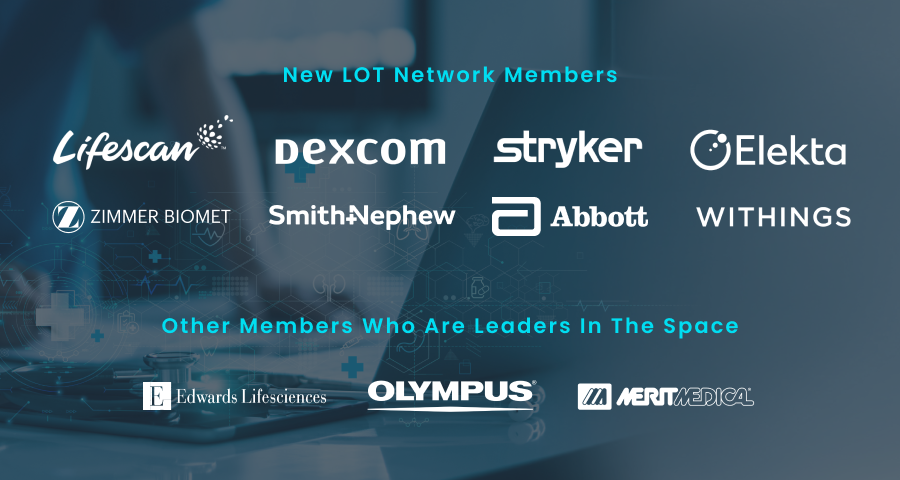“The medical device industry is undergoing a fundamental digital transformation that increases the risk posed by potential PAE litigation. Medical device executives should be asking their counsel what is actually being accomplished in the way of mitigation, 57% of U.S. patents on database functionality are currently available in the LOT Network patent pool,” said Keith Newburry, Founder of Newburry Strategic Advisory and formerly Senior VP and Chief IP Counsel at Edwards Lifesciences.
Largest patent protection network in the world provides immunization from PAE litigation to 4,500+ members
Medical technology companies are among the latest slew of companies looking to protect themselves against costly litigation from patent assertion entities (PAEs). In 2024 alone, 16 new medtech members have joined as of October, adding to a roster that includes Edwards Lifesciences, BD, Olympus / Evident, Boston Scientific, Stryker, Smith & Nephew, Dexcom, LifeScan, Agilent, Illumina, Merit Medical, Topcon Japan, TheraSigma, Concentric Health Alliance, Active Life Solutions, and others. Four of the current medtech members are in the Fortune 500.
“The medical device industry is undergoing a fundamental digital transformation that increases the risk posed by potential PAE litigation. As these risks mount, medical device executives should be asking their counsel what is actually being accomplished in the way of mitigation,” said Keith Newburry, Founder of Newburry Strategic Advisory and formerly Senior VP and Chief IP Counsel at Edwards Lifesciences. “The protection provided by LOT Network delivers one answer, as, for example, 57% of U.S. patents on database functionality are currently available in the LOT Network patent pool. Advanced database functionality, including security protocols, is increasingly important as ]medical device companies conduct clinical trials or have implants and sensors that continuously communicate hospital and outpatient patient data over the internet. I have helped companies understand these issues and have even seen new PAE litigation as this digital transformation now includes medical device implant products once thought to be relatively free of PAE risk.”
PAEs, referred to by some as “patent trolls,” are responsible for 87% of high-tech patent litigation. Many of these patents are acquired via third parties, with 86% originating from operating companies, and are used to generate revenue through litigation against potential infringers. Joining LOT Network helps safeguard against PAE litigation. If a PAE acquires any of the over 4.9 million patent assets owned by a LOT Network member, all LOT Network members gain a license to that patent, shielding them from potential lawsuits and fees.
Early on, LOT Network was primarily attractive to high-tech companies operating in the United States. However, as patented technologies have been integrated into virtually every market, the community’s relevance has expanded. With more than 4,500 current members, LOT Network has strong member representation among high-tech, automotive, retail, biotech, financial services, and industrial.
“LOT Network offers an opportunity for community members to dispose of patent assets in a responsible manner to the extent it ensures that transferred patents are licensed to other LOT Members if the patents are subsequently transferred to patent assertion entities,” said Mark Gorman, Associate General Counsel, Smith & Nephew. “At the end of the day, if you work for a company that is not interested in monetizing your patent portfolio via patent assertion entities, joining LOT Network helps to mitigate PAE risk at a minimal cost.”
Moreover, the risk of a PAE suit is no longer just a U.S.-only problem. Patent-friendly venues like the UPC in Europe, and the rise in PAE suits in China put more and more of a company’s revenue at risk. GXD-Bio, a subsidiary of Korean patent assertion entity Intellectual Discovery recently became the first non-practicing entity to assert a biotech patent at the UPC, and told IAM that it plans to source further biotech-related patents, anticipating a “paradigm shift” towards the life sciences among NPEs. Other PAEs are deliberating strategies for litigation outside the US: in March of this year, Gerald Padian, Managing Director of Atlantic IP, was quoted in IAM: “We’re looking at bringing UPC-only campaigns without a US component first, and then go to the US second.”
LOT Network membership protects a company’s products and services globally and has members from 56 different countries.
The medtech and health tech markets are focused on transforming healthcare delivery and management. The key to this transformation is the innovation and progress made by leveraging the benefits of technologies whose origins are outside the healthcare industry. As “medtech” becomes more “high-tech,” the industry recognizes it needs to deploy IP strategies similar to those traditionally used by high-tech companies. Although technology plays a crucial role in increasing accessibility, access and better health outcomes, there are risks and costs that inherently come with using this technology that must be addressed.
Photo by Testalize.me on Unsplash




